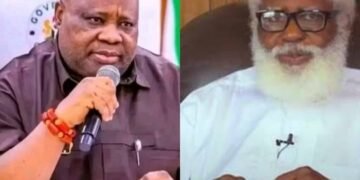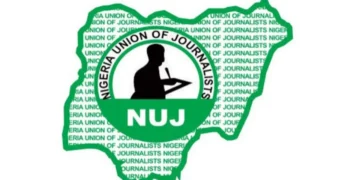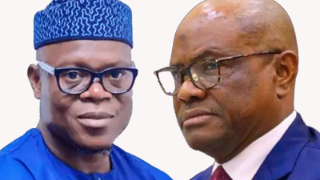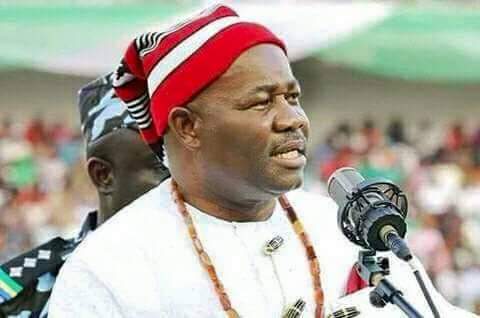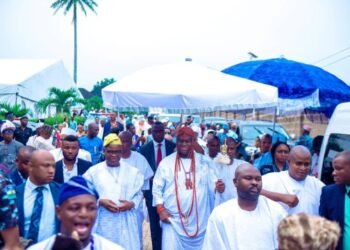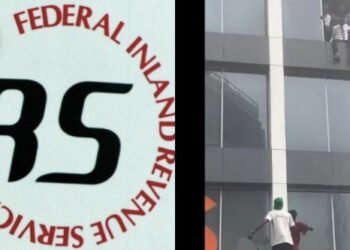How Akpabio Prevented ‘Rage Of The Niger-Delta‘
“I came in peace and in peace, I leave you!”
Above were the words of the Minister of Niger Delta and supervising Minister of the Niger Delta Development Commission (NDDC), Senator Godswill Akpabio, shortly after taking the wind off the sail of what would have been another Armageddon in the Niger Delta region.
The Niger Delta region, which has known relative peace in the last few years, was about to go up in flames for the umpteenth time, following the proclamation of a seven-day ultimatum to the Federal Government by Chief Government Ekpemupolo (aka Tompolo) over the failure of the government to inaugurate a substantive Board of the Niger Delta Development Commission (NDDC).
In fact, to use Tompolo’s words, the rage of the Niger Delta region was about to be awakened. The ex-warlord had, on May 31, said: “I wish to call on Mr. President, members of the National Assembly and security agencies to work towards the constitution of the substantive board of the NDDC, within a few days, to avert a total breakdown of law and order that will equally affect crude oil exploration and exploitation activities in the region.
“I hereby proclaim a seven-day ultimatum starting from the date of this publication to inaugurate the substantive board of the Commission.
“Senator Akpabio’s temporal (sic) reprieve from the Ijaw Youth Council (IYC) protest is a child’s play compare (sic) to what is to come in a few days. He is about to be awakened to the rage of the Niger Delta region.”
Tompolo had gone ahead to accuse Senator Akpabio and the Presidency of running the show and undermining the commission, claiming that the forensic audit embarked upon by the government was aimed at strangling the NDDC.
But rather than take offence with the false accusation and go on the defensive, as the forensic audit embarked upon by the Federal Government is to chart a new and better path for the NDDC Board and not to criminalise anyone or strangle the NDDC, Akpabio opted for peace, even in the face of wrong accusations.
For those conversant with Alaudits, the outcomes are expected to provide a direction and a window of opportunities for the future rather than dwelling on the past, unless of course, if there are questions that need answers.
Words from within the government circles have also indicated that the president is expected to give the new NDDC Board its terms of reference from the recommendations of the forensic audit so that it could better serve the people of Niger Delta.
With the threats from Tompolo premised on wrong assumptions, however, the cloud of uncertainty gathered and with that came rumbles of a storm that would have, again, thrown the Niger Delta into another needless crisis that will affect the peace of the region, throw its 17 million residents into panic and badly hit the nation’s oil production and by extension its already troubled economy.
But before the ship of crisis could sail, Akpabio, the man of peace stepped in. The former governor of Akwa Ibom, in a move described by several commentators as exhibition of extraordinary courage in the interest of Nigeria, embarked on an unscheduled visit to Tompolo’s country home in Oporoza, Gbaramatu Kingdom, Delta State on June 3, in the company of the Delta State deputy governor and other key figures.
The objective of the visit, which has been described as courageous, albeit suicidal, was to thaw the ice and avert another major face-off between Niger Delta militants/Tompolo and the Federal Government after the rumbles of 2016 and 2017, when the ex-militant was sought by the EFCC and the destructive days of the Niger Delta Avengers, as well as many other insecurity threats in the axis, which not only threatened the peace of the region but also resulted in several losses.
Of equal significance was the consideration of the implications that renewed hostilities in the region would have on the economy of the country and especially the effect they would have on the Niger Delta region and its people.
Among other things, renewed hostilities against oil facilities in the region would have resulted in the cancellation of the Amnesty Programme, which could leave about 30,000 beneficiaries stranded and pushed back into militancy.
Without the peace-building effort of the former Senate Minority Leader, an outbreak of hostilities would have also pushed the Niger Delta into more woes, bearing in mind that the region is yet to recover from the mass exodus of International Oil Companies (IOCs)2 and subsequent relocation to Lagos, which resulted in increased unemployment, low patronage for business owners and decreased Internally Generated Revenues (IGRs) for Niger Delta states.
Another round of hostilities would have spelled doom for the already troubled region, if not result to full-blown war.
As a patriotic Niger Deltan and a highly detribalised Nigerian, who has over the years, demonstrated uncommon passion for the well-being of the region and the country, Akpabio embarked on the eight-hour journey on the high sea to the creeks of Gbaramatu, where even the most valiant would dread to tread.
While the meeting was held behind closed doors, the result has come into the open: there is consensus building, which has led to continued peace in the Niger Delta. Tompolo has come out to suspend the ultimatum, which lapsed two Sundays ago.
The forensic audit will go on as planned while the substantive Board of the NDDC will be inaugurated at the end of that exercise.
Though many observers of events in the Niger Delta believe that the ultimatum and threats from the Tompolo camp were predicated on rumour and false allegations, and that they should not have been dignified as to gain ascendancy in the public space, as they were misguided, Akpabio’s peace initiative remains commendable.
For these observers, mostly of Niger Delta descent, the failure of the Tompolo camp and other agitators to ask questions of previous governments who let down the people of the Niger Delta through several uncompleted and abandoned projects, including the NDDC Headquarters, and many others, call to question the claimed patriotism behind the issuance of ultimatum on the NDDC Board.
One of such observers, Hope Ebipade, a lawyer, said: “The action of the Niger Delta Minister is highly commendable. The trip to Oporoza was extraordinary patriotism in action. The former governor demonstrated uncommon courage in the interest of Nigeria by embarking on that trip to foster peace, though the ultimatum should not have been issued or dignified, as it was based on false premises.
“We all know that the forensic audit of the NDDC is imperative due to the deep-seated corruption at the Commission over the years. The audit, in the end, will be in the interest of our region, so I expect all well-meaning indigenes of Niger Delta to support it.
“The question we should ask is why issue an ultimatum over the inauguration of the NDDC Board when there are other germaine issues affecting the region? It is on record that the Amnesty Programme has no interim administrator, yet no one is issuing an ultimatum.
“Rather than focus on that, the agitators chose to direct their ire at President Muhammadu Buhari over the appointment of Akwa Effiong as interim administrator of NDDC, a move that is meant to ensure quality service delivery at the Commission pending the inauguration of the substantive Board.”
Another commentator, Godsday John said: “We thank God for an uncommon leader like Akpabio. That singular act of seeking peace and consensus averted a major crisis that could have led to a war in our region. What is going on in the South-East between the Army and agitators from that zone is an indicator of what would have been.”
Today, as a result of former Governor Akpabio’s bravery and acquiescence with the unpopular views of renowned American professor, Michael Dediu, that “if you want peace, prepare for peace,” everyone is a winner over the NDDC Board matter that would have precipitated war.
The peace of the South-South geo-political zone is intact at a time when all other five zones are facing one insecurity challenge or the other. But for the peace initiative, the fragile peace in the country would have been further threatened and everyone knows how volatile the Niger Delta could be when it comes to face-offs over matters of interest to the region.
Also, thousands of youths whose future has become assured as a result of the invaluable roles being played by the Amnesty Programme will not be thrown into gloom. The Amnesty Programme to ex-militants could have been halted if the boys returned to targeting oil installations and countless families would have had their hopes dashed.
More importantly, the economy of the country will not take another hit at this period when the country is already troubled as a result of the global economic situation, with oil exploration at least continuing unhindered.
Yes, everyone came out a winner following Akpabio’s Olive Branch, but the biggest winners are certainly the people of Niger Delta, who can now look forward to an NDDC that is better positioned to serve their interest after 21 years of tending to the interests of a few.
The over 17 million people of the oil-rich zone and, indeed, all Nigerians can also heave a sigh of relief that, by the action of one man, who chose to travel the road of peace, an unnecessary carnage has been averted.
Though for Akpabio, the road of peace and patriotism is not strange; he travelled through familiar paths as governor of Akwa Ibom State for eight years, where he arrested youth restiveness with insightful and visionary initiatives in agriculture, youth engagement and massive employment creation, not many people expected a minister to risk everything to visit Gbaramatu kingdom.
If they did, not a lot of people expected this outcome, which has made the people enamoured with Senator Akpabio, who has been unnecessarily vilified for taking bold initiatives to reposition the Niger Delta Ministry to serve the people better.
With peace brokered and the continued peace being enjoyed in the Niger Delta and by extension Nigeria following Akpabio’s bold move, one is reminded of the concluding lines in Robert Frost’s poem, Road Not Taken. “Two roads diverged in a wood, and I- I took the one less travelled by, and that has made all the difference.”
•Aigbogun writes from Port Harcourt




